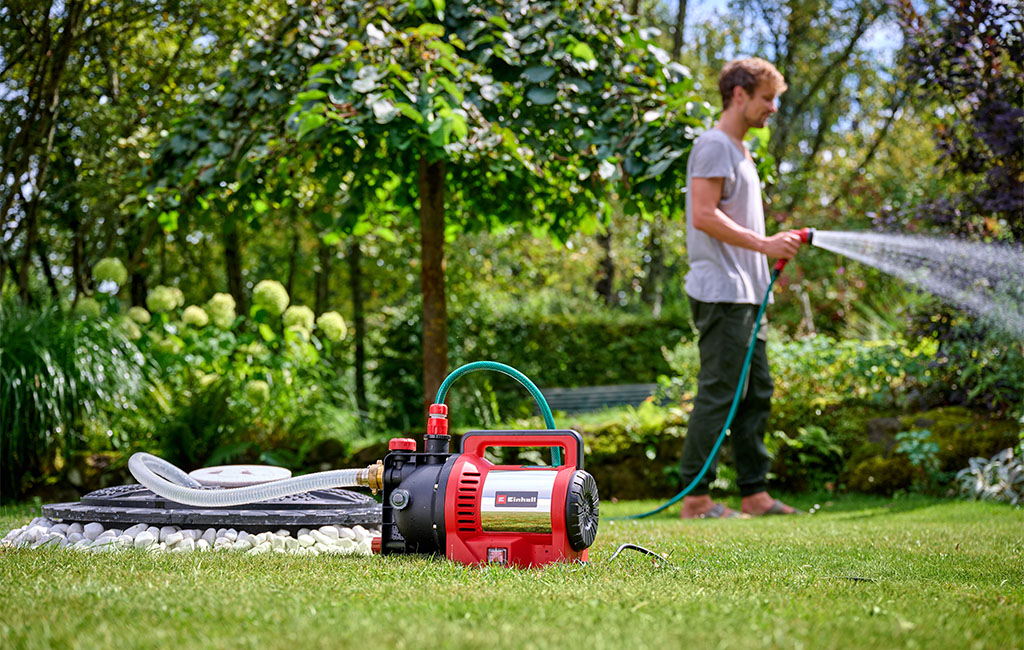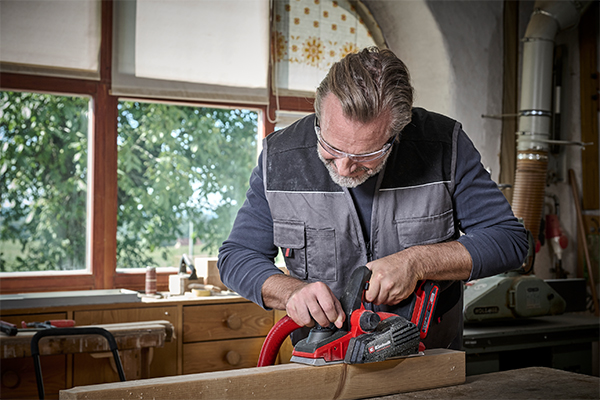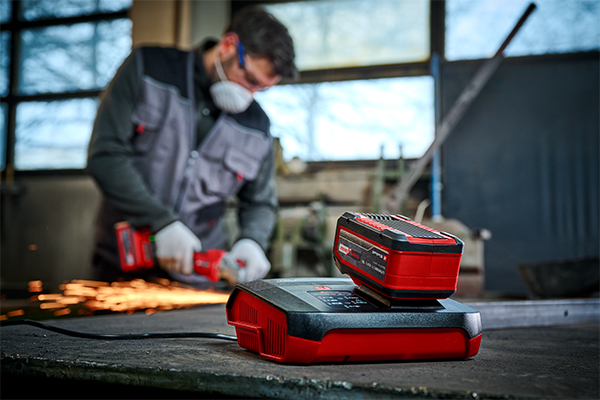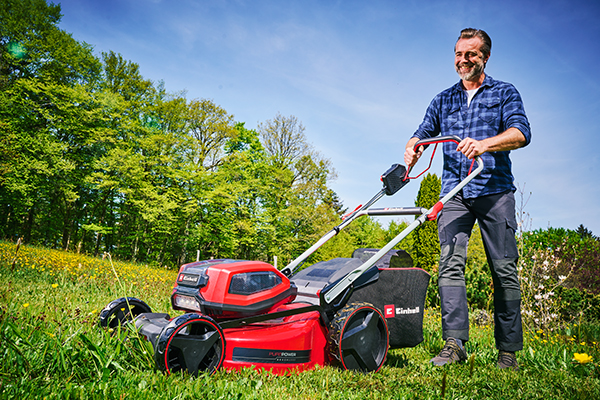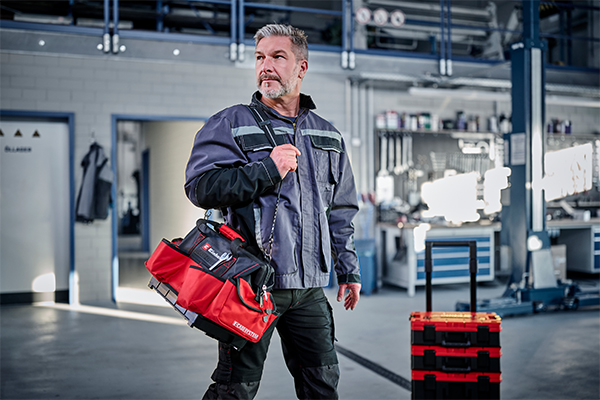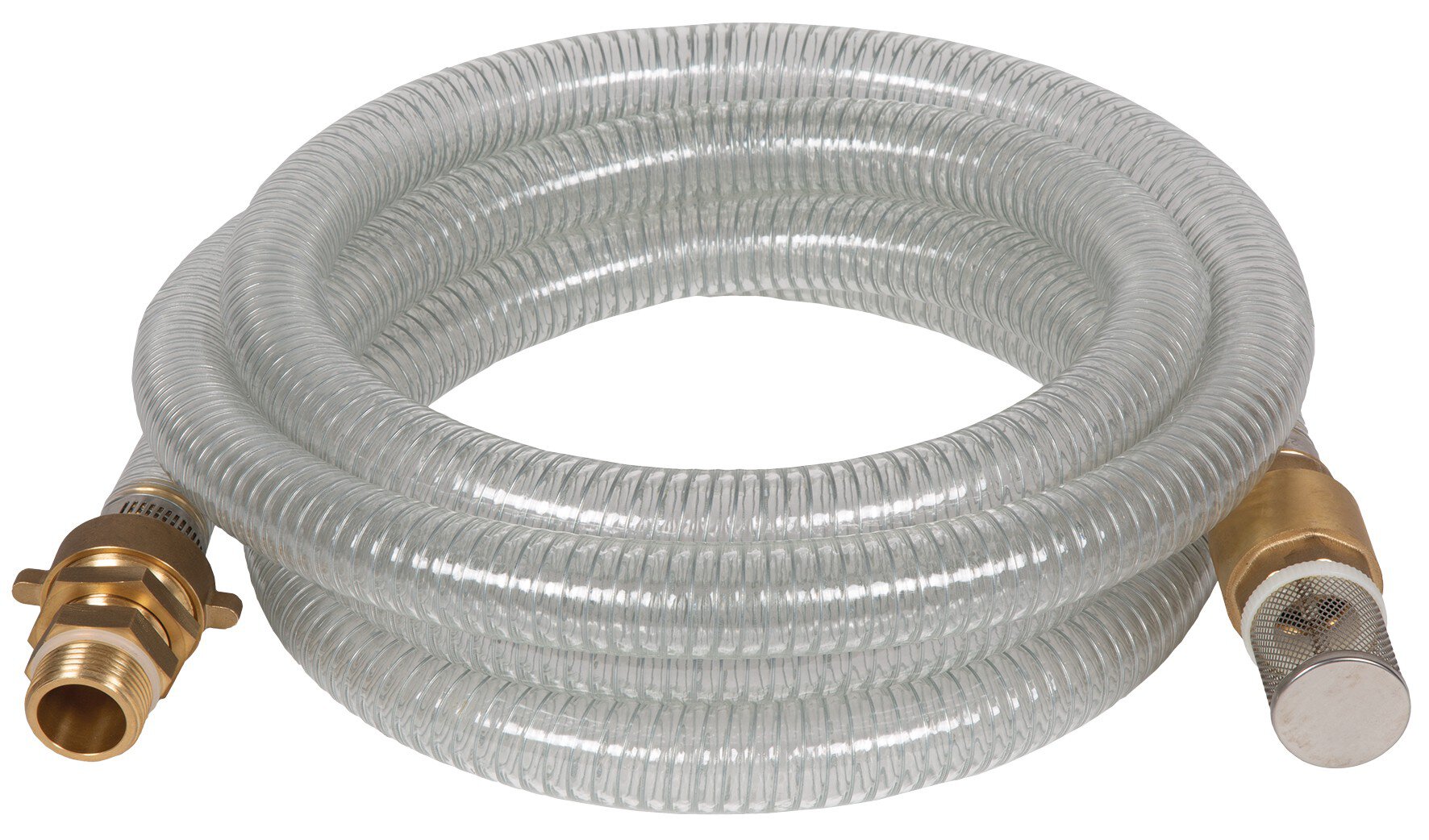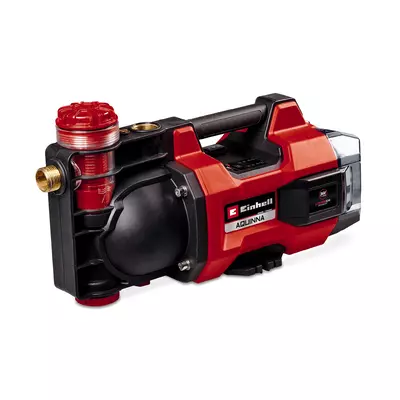The Garden Pump – Tips for Maintenance, Cleaning, and Connection
Garden pumps are true all-rounders when it comes to watering your garden. To ensure you and your plants benefit from the performance of our pump technology for as long as possible, we’ll show you how to maintain your pump properly. From cleaning to repairs: With our tips and tricks on maintenance and care, you can extend the lifespan of your garden pump. You’ll also learn how to connect a garden pump step by step, when to winterize it, and what to watch out for during startup.
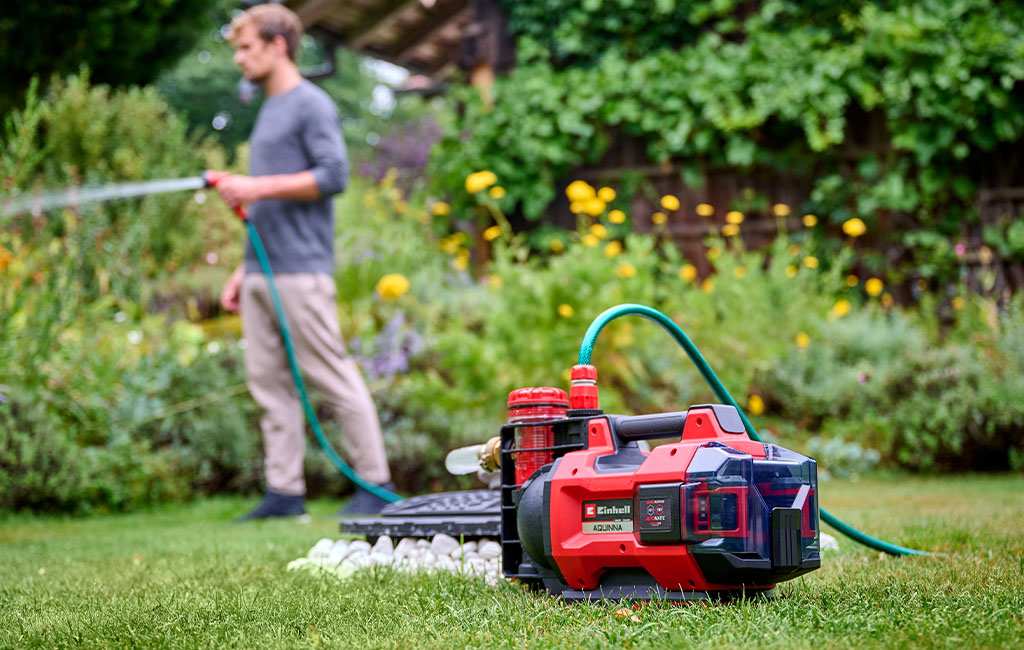
Connect the garden pump in just a few steps
Find the right location
There are many different types of water pumps. The garden pumps from Einhell are suction pumps – these draw water from a reservoir, such as a rain barrel or well, and convey it at high pressure of up to 5 bar, depending on the model.
Unlike submersible pumps, which float directly in the water, suction pumps are placed and connected outside the water. You can place the robust, mobile devices freely, but on a flat, solid surface, and you have to pay attention to the maximum suction height (maximum 8 metres).
Good to know: How the pump location and noise level are connected
Especially older water pumps can become quite loud over time. In addition to reliable maintenance, the location is a key factor that influences the noise level of garden pumps. If you want to reduce the noise of your pump, it is best to choose a location where it stands firmly and cannot vibrate or oscillate. Ideal surfaces are stone, concrete, or asphalt, such as in a carport, garage, or basement.
Correctly Connect Suction and Pressure Hose
Fill and Install the Suction Hose
The garden pump has two hose connections: the suction connection and the pressure connection. First, screw the hose that draws water from the water source onto the suction connection. To make venting easier afterward, you can fill the suction hose with water before connecting it. Make sure that the size of the hose matches the connection. Alternatively, you can use a suitable adapter. When choosing your suction hose, it's also important that it is equipped with a suction valve or a suction strainer with a check valve. Keep in mind that the suction hose should not be positioned higher than the pump and that the suction strainer is deep enough in the water to prevent the pump from running dry.
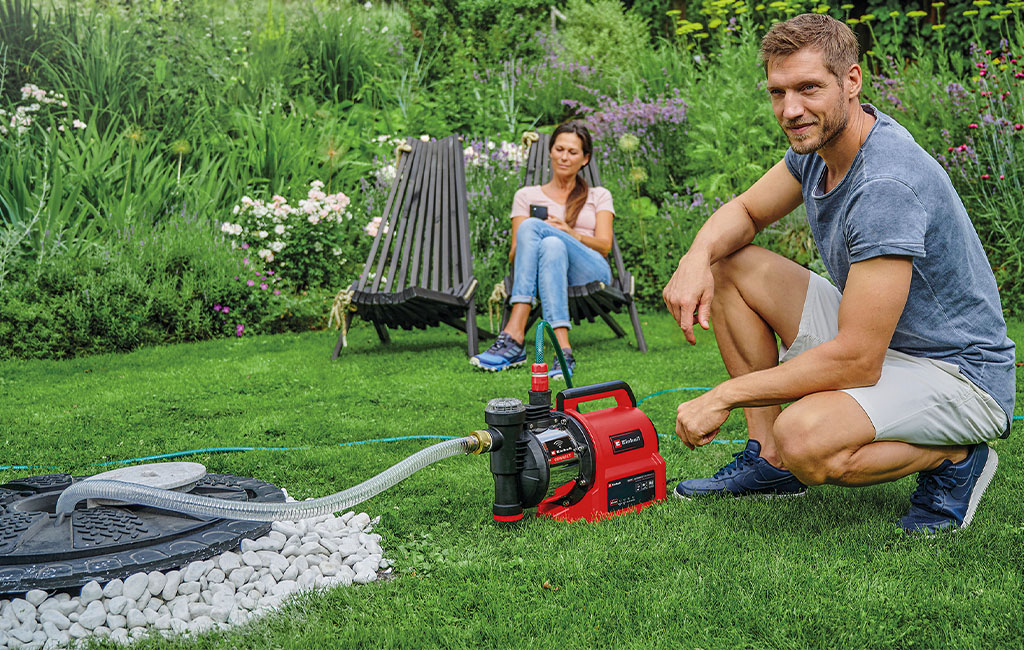
Tip: Prevent Contamination with a Pre-Filter
- Pumps with Pre-Filter: Certain pump models are already equipped with an integrated filter, while others are not. Although garden pumps are usually operated with clean water, often collected rainwater from rain barrels, wells, or cisterns, small dirt particles can accumulate in the filter or the pump. You can check in the user manual whether your model has a filter.
- Pumps without Pre-Filter: For models that do not have an integrated filter, you can use a separately available pre-filter. When purchasing the pump pre-filter, make sure that the maximum flow rate and the type of connection are compatible with your device. Installation is simple, as the pre-filter is just screwed between the suction hose and the pump. Pay attention to the flow direction! You can see if the water is flowing correctly thanks to the transparent filter housing.
Connect Garden Hose
You can then connect your garden hose to the pressure connection, usually using an adapter with a threaded nipple. Again, it is important that the sizes of the hose and the connection match. If you want to use a garden hose with a smaller diameter, you will also reduce the delivery rate of your pump, as less water can be pumped through the smaller hose.
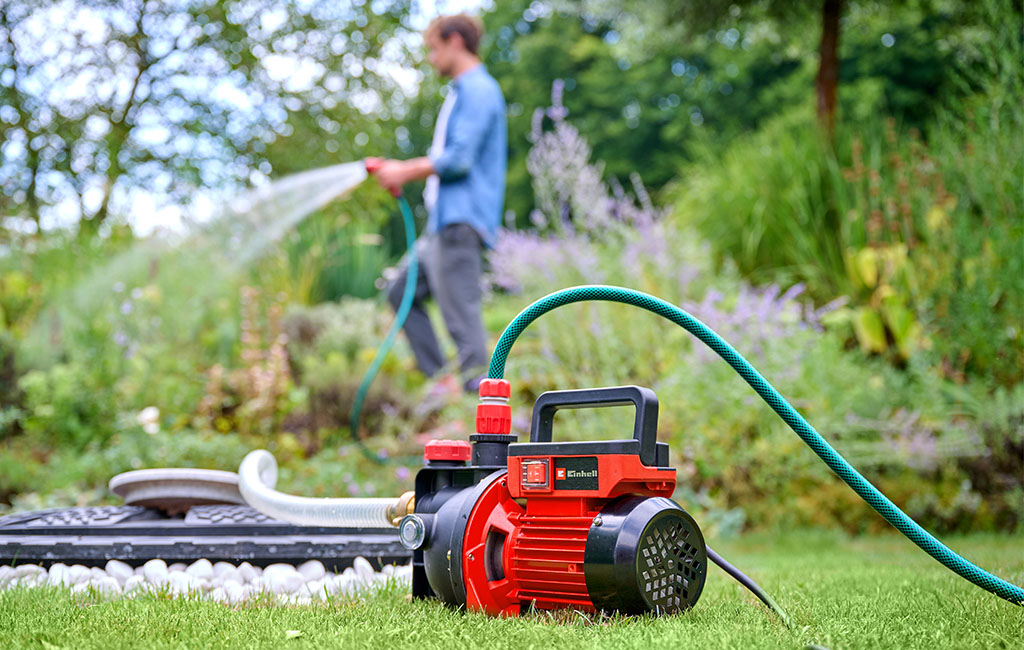
Suitable Accessories: Hoses, Adapters, and More
If you are looking for pump accessories, such as a new hose, you should make sure that the connections of the hoses and the water pump are compatible. These are described by internal and external threads as well as by size in millimetres or inches.
Venting the Garden Pump
Before using your garden pump for the first time, you must fill it with water. You can easily fill water through a separate filling opening. If your pump is equipped with an integrated pre-filter, you should remove the pre-filter first and reinsert it once the pump is completely filled. By filling the pump, it is simultaneously vented, as the water displaces the air inside the pump and allows the integrated impeller to create the necessary vacuum. For the self-priming pump to vent automatically, the pressure line must be open during the suction process. This means you need to actively use the attached garden nozzle. Once water flows out of the nozzle, the remaining air can escape from the pump. If air repeatedly enters the hose, you should check the hoses, seals, and connections for leaks.
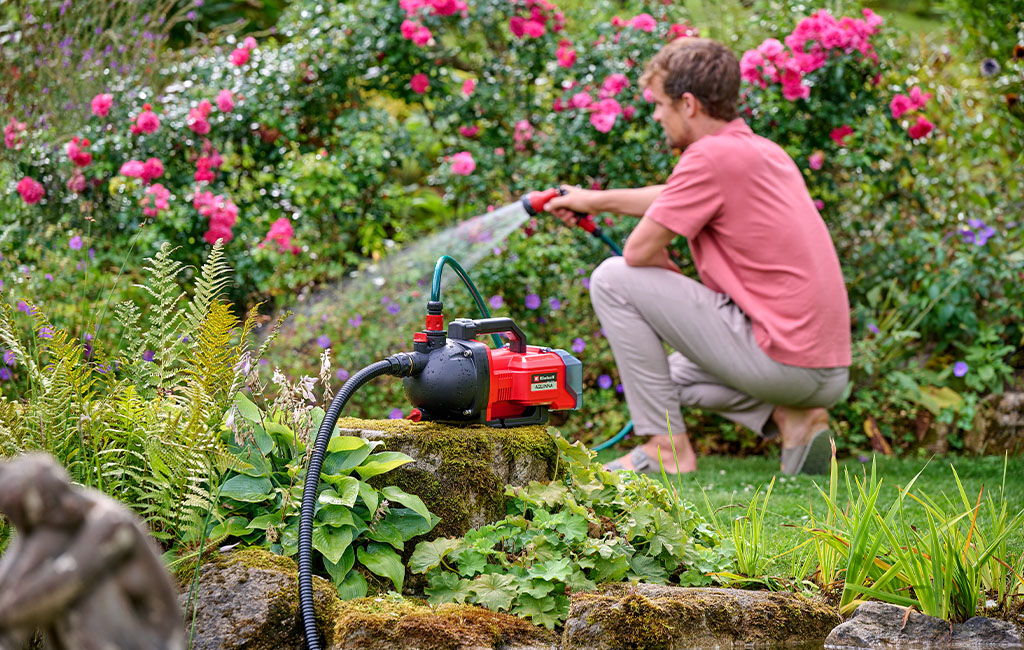
Occasionally check whether the water level in the pump is high enough. Our newer pump models are equipped with a viewing glass, allowing the water level to be visible from the outside at any time. If air accumulates again at the impeller, it can negatively affect the performance and lifespan of your device. Regular venting, as just described, helps to prevent this.
When should you vent a garden pump?
You should check and, if necessary, refill the water level in the pump every time you start it up and especially after a longer period of inactivity. This means that this step is not only important during the first use but also when de-winterizing, changing the location of your pump, after cleaning, or similar situations.
Which pumps do not need to be vented?
Submersible pumps, such as clear water pumps, dirty water pumps, deep well pumps, and submersible pressure pumps, are always completely immersed in water and therefore, in a way, vent themselves automatically. Venting, however, is important for surface pumps, such as garden pumps, domestic water systems, domestic waterworks, and petrol water pumps.
How do I clean my garden pump?
Proper Cleaning
Even though Einhell garden pumps should only be operated with clean water, dirt buildup over time is inevitable. Dirt particles in rainwater or contaminants in well water are just part of everyday gardening. The most affected by dirt is the filter integrated into certain pumps. It cleans the water, protecting the motor and the pump’s impeller. To prevent this pre-filter from becoming clogged, it should be cleaned regularly. You can easily remove the filter and clean it under clear water. This also applies to pre-filters that you have installed as separate accessories.
You should also clean the pipes and hoses once a year to remove dirt and deposits. Always check your user manual to see which cleaning agents and descalers are safe to use to avoid damaging the high-quality mechanical seals. Please note: During maintenance, the pump must not be connected to the power supply, and the batteries must be removed from your battery-powered pump beforehand! After reconnecting your water pump, you should refill and vent it again before turning it on.
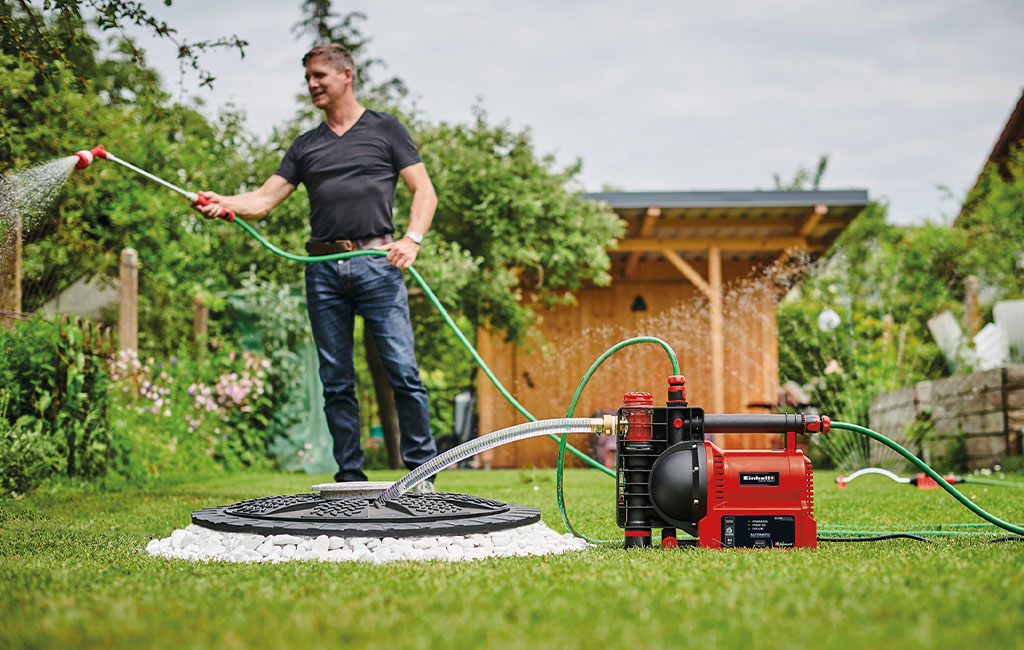
Your pump is getting louder? This could be the reason!
If your pump is placed on a solid, level, and horizontal surface but is still getting louder, it might be due to the connected pipes. Flexible plastic hoses can help solve this problem. Additionally, you can check whether your water pump has holes in its base. With these, you could securely fix the device to the ground to minimize vibrations. The modern garden pumps from Einhell are among the quietest of their kind.
If your water pump is already getting old, you might also consider upgrading to a quieter, newer model. Our Power X-Change cordless garden pumps are especially suitable, as they can be used throughout the garden independently of the power grid. This gives you maximum flexibility when it comes to pumping water from one place to another! You can use our pump advisor to find out which model is best suited for you.
Product was added to the comparison list.
Product was removed from the comparison list.
Open comparison listPump damaged? Here you can find spare parts for repair
Is your water pump no longer working as it should? Your first point of contact for quick help should always be the user manual, as it often contains common issues and how to fix them yourself. In many cases, you can repair your pump with just a few simple steps. If a specific component of the device is damaged or worn out, you can use the Einhell Service Shop to search for your device by serial number or article number and identification number. Using an exploded diagram, you can find the required spare part and order it directly online.
Winterizing the Pump: Frost Protection and Storage
Making Garden Pumps Winterproof
Garden pumps are suction pumps usually set up outdoors. Due to freezing water, they are generally not winterproof. Proper maintenance is necessary to protect them from the cold.
Before the first frost, you should ensure that all hoses and pipes leading to and from the pump are free of water. This prevents damage to the pipes caused by frozen water. The pump itself should definitely be disassembled and stored properly. We will show you the best way to do this in the next step.
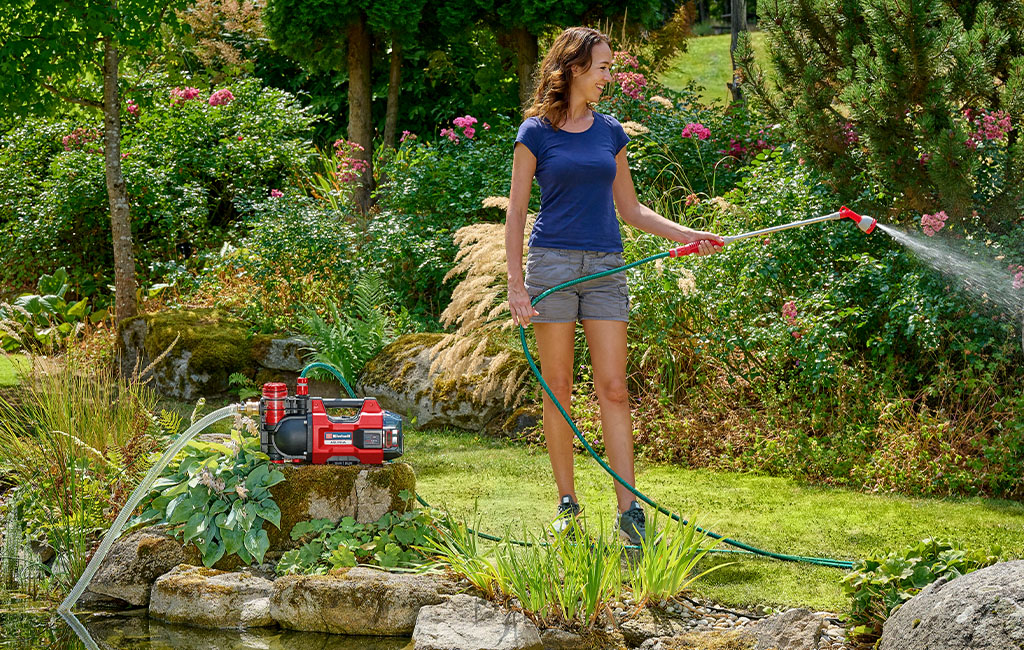
Optimal Storage of Water Pumps
If you won’t be using your garden pump for an extended period, it is important to store it properly. The following steps are necessary:
- Disconnect the pump from the power supply and clean it as described above.
- Einhell garden pumps are equipped with a convenient water drain screw. Open the screw and allow the water to drain completely. This prevents rust damage to metal parts and damage caused by the expansion of freezing water.
- Dry the pump and store it in a dry, frost-proof room.
Getting the Pump Ready for Spring Again
If you have stored your pump correctly, reconnecting it in the spring is a breeze. Your pump will be in perfect condition, and you can connect it just as explained at the beginning of the post. Simply choose a location, check the connections, fill with water, vent it, and you’re ready to go.
